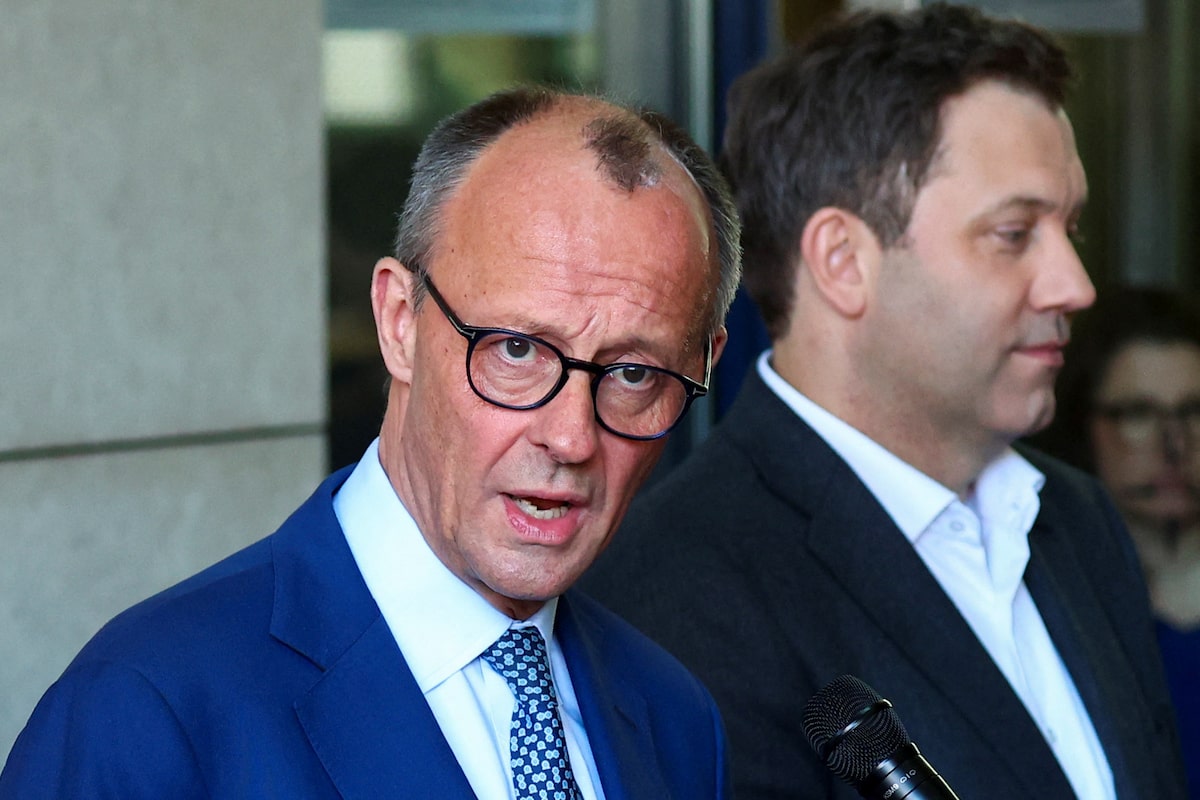Germany: Conservatives And Social Democrats Initiate Coalition Negotiations

Table of Contents
Key Players and Their Objectives
The success of these coalition negotiations hinges on the ability of the CDU/CSU and the SPD to find common ground on a range of critical issues. Their contrasting ideologies and priorities present significant hurdles.
CDU/CSU's Negotiating Position
The CDU/CSU, traditionally associated with fiscal conservatism, enters these negotiations with a focus on economic stability and strengthening Germany's role within the European Union. Their key objectives include:
- Fiscal Conservatism: Maintaining a balanced budget and avoiding excessive government spending.
- Economic Growth: Promoting pro-business policies and fostering a competitive market environment.
- EU Leadership: Strengthening Germany's influence within the European Union and advocating for reforms.
However, potential sticking points include:
- Migration Policy: The CDU/CSU generally favors a stricter approach to immigration compared to the SPD.
- Climate Change Initiatives: While acknowledging the need for climate action, the CDU/CSU may resist policies they view as excessively burdensome on businesses.
Specific policy proposals from the CDU/CSU likely include tax cuts for businesses, increased investment in infrastructure, and a more cautious approach to European integration.
SPD's Negotiating Position
The SPD, representing a more socially liberal perspective, prioritizes social justice, strengthening the welfare state, and ambitious climate action. Their negotiating position emphasizes:
- Social Justice: Reducing inequality, improving social security, and investing in education and healthcare.
- Climate Action: Rapidly transitioning to renewable energy, implementing stricter emission reduction targets, and investing in climate adaptation measures.
- Strengthening the Welfare State: Expanding social programs to ensure a strong social safety net for all citizens.
However, the SPD faces potential challenges, including:
- Budgetary Constraints: Balancing ambitious social programs with the need for fiscal responsibility.
- Compromises on Social Programs: The need to compromise on some social policy proposals to secure a coalition agreement.
The SPD's specific policy proposals are expected to include significant investment in renewable energy, reforms to the healthcare system, and increased funding for social programs.
The Role of Smaller Parties
While the CDU/CSU and SPD are the dominant players in these negotiations, the influence of smaller parties cannot be entirely dismissed. Although not directly involved in the core negotiations, their stances on key issues and potential future support for legislation could influence the final coalition agreement. Their demands, even if not directly met, may indirectly shape the compromises reached by the two major parties.
Major Policy Areas Under Negotiation
The coalition negotiations will cover a wide range of policy areas, with significant potential for disagreements and compromises.
Economic Policy
The CDU/CSU and SPD hold differing views on economic policy, particularly regarding fiscal policy and taxation. The CDU/CSU favors lower taxes and reduced government spending, while the SPD advocates for progressive taxation and increased investment in public services. Reaching a consensus on these issues will be crucial for the stability of any future coalition government.
Climate Change Policy
Climate change represents a major point of contention. The SPD advocates for a rapid and ambitious transition to renewable energy, while the CDU/CSU, while acknowledging the need for action, may favor a more gradual approach. Finding a common ground on emissions reduction targets, carbon pricing mechanisms, and investment in renewable energy technologies is essential.
Social Policy
Discussions around social policy will focus on welfare reforms, unemployment benefits, healthcare, and pension systems. The SPD is likely to push for enhancements to social security and increased investment in healthcare, while the CDU/CSU may advocate for more market-oriented reforms.
Migration Policy
Migration policy is arguably one of the most contentious areas. The CDU/CSU is expected to advocate for stricter border controls and immigration policies, while the SPD may favor a more welcoming approach. Reaching a compromise on asylum procedures, integration programs, and the overall approach to immigration will be crucial.
Challenges and Potential Outcomes
Several challenges could derail the coalition negotiations. Internal disagreements within both parties, conflicting policy positions on key issues, and the time constraints involved in forming a government all pose significant risks.
- Internal Party Disagreements: Both the CDU/CSU and SPD encompass a spectrum of views, and internal disagreements could impede the negotiating process.
- Conflicting Policy Positions: The stark differences in ideology between the two parties on several crucial issues could make finding common ground difficult.
- Time Constraints: The need to form a government within a reasonable timeframe adds pressure and limits the time available for negotiations.
If negotiations fail, several scenarios are possible, including a minority government, new elections, or alternative coalition options involving other parties. However, a successful coalition between the CDU/CSU and SPD remains the most likely outcome, given the current political landscape.
Conclusion
The CDU/CSU and SPD coalition negotiations are of paramount importance for Germany's future. The outcome will shape the country's domestic and foreign policies for years to come. The key policy areas under discussion – economic policy, climate change, social policy, and migration – all demand careful consideration and compromise. The challenges ahead are significant, but a successful coalition agreement could usher in a new era of political stability and cooperation in Germany.
Call to Action: Stay informed about the progress of the Germany: Conservatives and Social Democrats coalition negotiations and their implications for German and European politics. Follow our website for regular updates on this crucial political development. Understanding the intricacies of these coalition negotiations is key to understanding the future direction of Germany.

Featured Posts
-
 Shrimp Ramen Stir Fry Customize Your Flavor Profile
May 01, 2025
Shrimp Ramen Stir Fry Customize Your Flavor Profile
May 01, 2025 -
 The Target Boycott A Reflection On Corporate Social Responsibility And Consumer Activism
May 01, 2025
The Target Boycott A Reflection On Corporate Social Responsibility And Consumer Activism
May 01, 2025 -
 Investigation Into Multi Million Dollar Nfl Player Robberies Chilean Migrants Arrested
May 01, 2025
Investigation Into Multi Million Dollar Nfl Player Robberies Chilean Migrants Arrested
May 01, 2025 -
 Feltri E Il Simbolismo Del Venerdi Santo
May 01, 2025
Feltri E Il Simbolismo Del Venerdi Santo
May 01, 2025 -
 Almhakmt W Alhkm Fy Qdyt Ryys Shbab Bn Jryr
May 01, 2025
Almhakmt W Alhkm Fy Qdyt Ryys Shbab Bn Jryr
May 01, 2025
Latest Posts
-
 Selena Gomezs High Waisted Power Suit An 80s Office Style Icon
May 02, 2025
Selena Gomezs High Waisted Power Suit An 80s Office Style Icon
May 02, 2025 -
 Bbcs Celebrity Traitors Production Hit By Last Minute Sibling Withdrawals
May 02, 2025
Bbcs Celebrity Traitors Production Hit By Last Minute Sibling Withdrawals
May 02, 2025 -
 Celebrity Traitors On Bbc Chaos Ensues As Famous Siblings Drop Out
May 02, 2025
Celebrity Traitors On Bbc Chaos Ensues As Famous Siblings Drop Out
May 02, 2025 -
 Bbc Celebrity Traitors Sibling Withdrawals Cause Chaos Before Filming
May 02, 2025
Bbc Celebrity Traitors Sibling Withdrawals Cause Chaos Before Filming
May 02, 2025 -
 Following Celeb Traitors Daisy May And Charlie Coopers Next Tv Venture
May 02, 2025
Following Celeb Traitors Daisy May And Charlie Coopers Next Tv Venture
May 02, 2025
